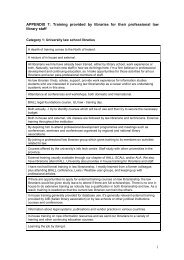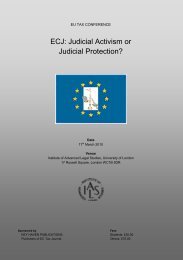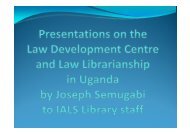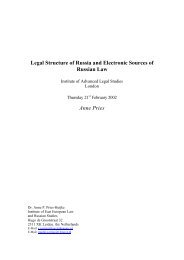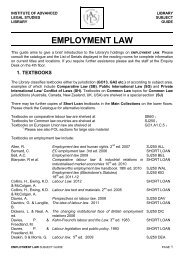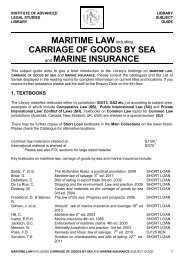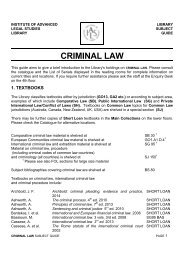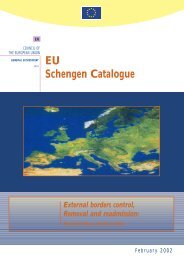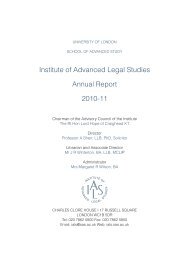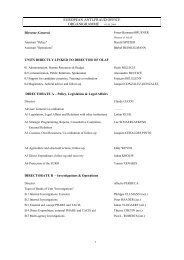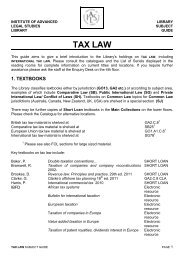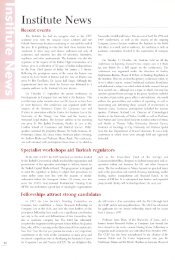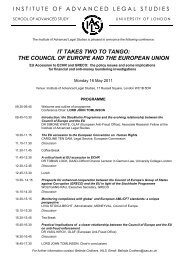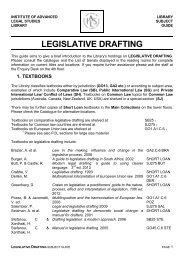a thesis - Institute of Advanced Legal Studies
a thesis - Institute of Advanced Legal Studies
a thesis - Institute of Advanced Legal Studies
You also want an ePaper? Increase the reach of your titles
YUMPU automatically turns print PDFs into web optimized ePapers that Google loves.
CONSTRUCTION OF EXPRESS TRUSTS. 69<br />
remainder to the heirs <strong>of</strong> the body, the court decrees a strict<br />
settlement in conformity with the presumable intention."<br />
The case <strong>of</strong> Newcastle v. Lincoln (infra) shows that the same<br />
method <strong>of</strong> construction must be applied to an executory trust in<br />
an ante-nuptial settlement.<br />
Illustrations.<br />
1. A. by marriage articles covenants to settle land upon trustees<br />
to the use <strong>of</strong> him, A., for life without waste, remainder to the use<br />
<strong>of</strong> B., his intended wife, for her life, remainder to the use <strong>of</strong> the<br />
heirs male <strong>of</strong> him on her body begotten, remainders over. The<br />
settlement must limit the property to A. for life, remainder to his<br />
first son in tail. Trevor v. Trevor (1720), 1 P. Wms. 622.<br />
2. A. in an ante-nuptial marriage settlement covenants to settle<br />
leasehold estates in trust for such persons and such or the like<br />
estates as far as the law will allow, as declared concerning real<br />
estates limited to the first and other sons <strong>of</strong> the marriage in tail<br />
male with several remainders. The settlement in pursuance <strong>of</strong><br />
this covenant must be so framed that no person shall be entitled to<br />
the absolute property in the leaseholds until he attains twenty-one.<br />
Newcastle v. Lincoln (1797), 3 Yesey, 387; 12 Yesey, 217.<br />
Executory Trusts in Wills.—" In a will there is no presumption<br />
that the testator means one quantity <strong>of</strong> interest rather than another,<br />
an estate for life rather than an estate in fee." .... Even in a<br />
will, however, "if it is clearly to be ascertained from anything in<br />
the will that the testator did not mean to use the expressions which<br />
he has employed in their strict proper technical sense, the court in<br />
decreeing such settlement as he has directed will depart from his<br />
words in order to execute his intention." (Blackburn v. Stables,<br />
supra; and see the judgment <strong>of</strong> Lord Eldon in Jcrvoise v. Duke <strong>of</strong><br />
Northumberland (1820), 1 J. & W. at p. 574; and Sackville-West<br />
v. Viscount Holmesdale, infra, at p. 555.)<br />
" The only difference," said Lord Hatherley, " in the case <strong>of</strong> a<br />
will, or deed <strong>of</strong> gift, not being marriage articles, is this, that the<br />
intent must appear in some manner on the face <strong>of</strong> the instrument<br />
in order to justify the court in directing a settlement which does<br />
not follow the exact words employed in the instrument containing<br />
the executory trust, but by varying them effects the presumed



